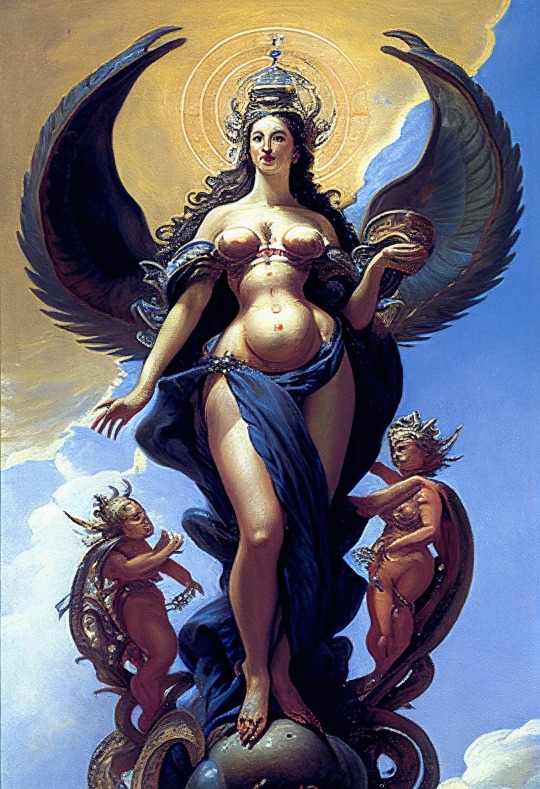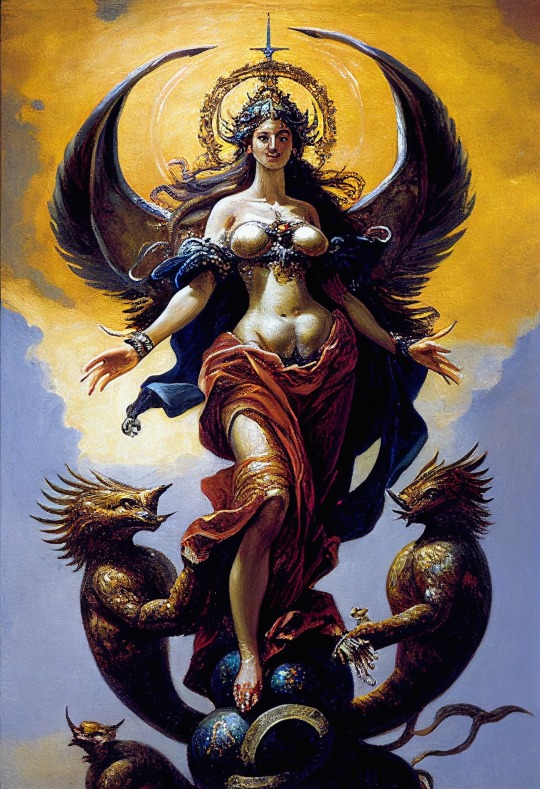#nicola denzey
Explore tagged Tumblr posts
Text


The Goddess Sophia Talon Abraxas
“Allegory of Divine Wisdom”
In Gnosticism, the “Fall” didn’t occur through Adam and Eve – it happened before the world’s creation, through a mistake made by a heavenly being called Sophia (whose name is Greek for “Wisdom.”
The story of Sophia’s fall (which was part of the Gnostic creation myth) is told slightly differently in the many Gnostic texts that discuss it, but the various versions of the tale all share the basics in common.
Sophia was one of the “aeons” – divine entities who were descended from God the Father and who were roughly equivalent to angels. Of the many aeons, Sophia was the last to arise from God.
Like the other aeons, Sophia was the child of a male-female pair of aeons that had come before her, who had given birth with the Father’s blessing. Sophia and the rest of the aeons formed the “Pleroma” (Greek for “Fullness”), the Gnostic name for Heaven.
Sophia wanted to have a child, too. But she went about it in the wrong way: she conceived without the involvement of her male partner or the approval of the Father. Her child was the “demiurge,” a misshapen, belligerent creature that was utterly unlike the other heavenly beings.
Sophia immediately realized her horrible mistake and cast her child out of the Pleroma. The demiurge, now alone, believed that he was the only being who had ever existed, and created the material world out of his ignorance, foolishness, and malevolence, trapping sparks of divinity within Adam and Eve along the way.
Because of her fall and its dire consequences, Sophia became a flawed being. Her deficiency rendered her unable to remain in the perfect “Fullness” of the Pleroma, so she was placed just outside of the Pleroma, in a realm above that of her malevolent son. In anguish, Sophia repented, and the Father agreed to bring her back to the Pleroma once what had become lacking in her was restored to its natural fullness.
Precedents for Sophia in Jewish Literature
In the genre of Jewish (“Old Testament”) writing known as “wisdom literature,” Wisdom (Hokma in Hebrew was personified, and she gave monologues describing her great deeds and articulating her perspective on the world. Since Hokma, like the Greek Sophia, is a feminine noun, Wisdom was cast as a female figure. In the words of Nicola Denzey Lewis, Wisdom is “God’s active feminine principle, at once a part of God but also separate from God,” as in Proverbs 8, Job 28, and Sirach 24. In this regard, she’s much like the Gnostic aeons, who are also semi-independent extensions of God. They act, whereas God himself simply is.
Here’s an example of one of Wisdom’s monologues, Proverbs 8:22-31:
The Lord created me at the beginning of his work, the first of his acts of long ago. Ages ago I was set up, at the first, before the beginning of the earth. When there were no depths I was brought forth, when there were no springs abounding with water. Before the mountains had been shaped, before the hills, I was brought forth— when he had not yet made earth and fields, or the world’s first bits of soil. When he established the heavens, I was there, when he drew a circle on the face of the deep, when he made firm the skies above, when he established the fountains of the deep, when he assigned to the sea its limit, so that the waters might not transgress his command, when he marked out the foundations of the earth, then I was beside him, like a master worker; and I was daily his delight, rejoicing before him always, rejoicing in his inhabited world and delighting in the human race.
The Gnostic depiction of Sophia was surely heavily influenced by this earlier Jewish depiction of Wisdom, both directly and indirectly through the works of thinkers such as Philo of Alexandria, a first-century Jewish intellectual who worked personified Wisdom into a rationalized cosmological system that sought to synthesize and harmonize the Jewish scriptures with the works of Plato, another importance influence on the Gnostics and early Christians more generally.
Sophia and Non-Gnostic Christians
Some texts from the Valentinian school of Gnosticism connect the story of Sophia’s fall to the fate of non-Gnostic Christians – that is, Christians who have the baseline Christian virtue of faith but not the higher mystical insight of gnosis, the root of the word Gnostic.
For these Valentinians, those with gnosis will ascend to the Pleroma after their deaths to partake of its perfect “Fullness.” Christians without gnosis will still be saved, but will have to spend some time in the place where Sophia was put after her fall, so that they, like her, can continue to advance in perfection until they’re worthy of being admitted to the Pleroma. You could say that Sophia’s realm is much like Purgatory in this view.
The existence of Sophia’s celestial waiting room of sorts enabled these Valentinians to have their cake and eat it, too: to preserve the special privilege that they believed gnosis imparted to them, while nevertheless being able to reassure other Christians that they, too, would ultimately be saved. This was surely a socially advantageous view, since it placed the Valentinians within the wider Christian fold rather than apart from it.
35 notes
·
View notes
Quote
A later Isis hymn from Cyrene confirms the cosmic power of the Goddess: "[T]he stars do not go their own course if they have not received My command [Gk ἐντολή]." The convert to Isis's cult received a new birth, free from an astrally ordained genesis. In Apuleius's "Metamorphoses," Isis informs Lucius: "[Y]ou shall know that I, and I alone, have the power to prolong your life beyond the bounds appointed as your fate" (scies ultra statuta fato tuo spatia vitam quoque tibi prorogare mihi tantum licere). Recently, Mithraic scholar David Ulansey has demonstrated that the complex cosmological symbolism of Mithraic iconography likely represents a code that, when properly understood, revealed the central "mystery" of Mithraism: Mithras alone possessed the power to rotate the cosmic axis. This esoteric knowledge carried profound implications for the Mithraic initiate; he acknowledged that, in Ulansey's words, "the entire cosmos was completely under [Mithras's] control." Mithras, through His power to alter the cosmic fabric, could deliver His proteges from "the forces of fate residing in the stars."
A New Star on the Horizon: Astral Christologies and Stellar Debates in Early Christian Discourse by Nicola Denzey in “Magic in History: Prayer, Magic, and the Stars in the Ancient and Late Antique World” edited by Scott Noegel, Joel Walker, and Brannon Wheeler (p 214-5)
1 note
·
View note
Quote
All religious practices that are spontaneous, of the moment, unauthorized, private and 'popular' need not be counter-performances to the sacramental system of a developed church. Rather, they likely acted as necessary 'gap-fillers', filling in where a specific need was perceived ... Similarly, in Late Antiquity, those who affixed rings or bells to the mortar of tomb closures likely had little sense of their behaviour as 'un-Christian', just as they had little sense of participating in 'popular culture' by doing so.
Nicola Denzey Lewis (“Popular Christianity and Lived Religion in Late Antique Rome,” found in Popular Culture in the Ancient World, 274-275)
11 notes
·
View notes
Text
“Imagine the original force in the cosmos as a giant eye that can look. All it does, in fact, is look. When it looks, it sees only itself reflected in the primordial waters. This reflection or image is not the First Principle but a natural reproduction of it: a Second Principle. It is therefore a form of differentiated creation; not the original thing but its reflection. This is one way that an original First Principle can and does “create” asexually, thus producing difference. The reflection is also inferior to the original, because it is derivative. Thus the farther one gets in reflected or refracted derivation from an original, the more difference or defect that it has from an original.”
- A quote from Introduction to “Gnosticism” by Nicola Denzey-Lewis, or a description of the Homeworld from a Faction Paradox book?
#faction paradox#caldera#homeworld#gallifrey#the book of the war#cities made of song#it's the first one
36 notes
·
View notes
Quote
If we allow ourselves to be influenced by the biases of these sources themselves, it is easy enough to perceive Montanists as having polemicized against "Gnosticism." Tertullian, for instance, himself a Montanist later in life, reports that the Montanist Proclus wrote against the Valentinians. Tertullia himself composed a number of treatises, such as On the Soul, which we conventionally define as "anti-Gnostic." Yet the label is misleading. Tertullian argued not against "Gnostics," but against certain Christians who rejected voluntary martyrdom, who denied the resurrection of the flesh (as in the case of On the Soul), and who devalued the flesh. He did not refute movements per se, but rather theological opponents like Marcion and Valentinus. As Michael Williams has recently argued, none of these movements, nor any single figure such as Marcion or Valentinus, necessarily or consistently represented a movement or philosophy that we can safely label "Gnosticism," taken as a whole.
Nicola Denzey Lewis (What Did the Montanists Read?)
3 notes
·
View notes
Quote
Early Christians appear to have drawn the model of Christ subverting astral destiny from Graeco-Roman paradigms. The same theme of a God controlling cosmic order appears, for example, in literature associated with Isis and Mithras. That Isis transcended and controlled astral destiny is attested as early as the Hellenistic era; in an aretalogy from Cyme dated between 306 and 283/282 BCE, the Goddess proclaims: "I am She Who Rises in the Dog Star I separated the earth from the Heavens I showed the paths of the stars. I ordered the course of the sun and the moon I am living in the rays of the sun I govern the path of the sun Everything obeys Me I deliver those who are enchanted. I overcome Fate [Gk τὸ ϵἱμαρένον] Fate submits to Me."
A New Star on the Horizon: Astral Christologies and Stellar Debates in Early Christian Discourse by Nicola Denzey in “Magic in History: Prayer, Magic, and the Stars in the Ancient and Late Antique World” edited by Scott Noegel, Joel Walker, and Brannon Wheeler (p 213-4)
0 notes